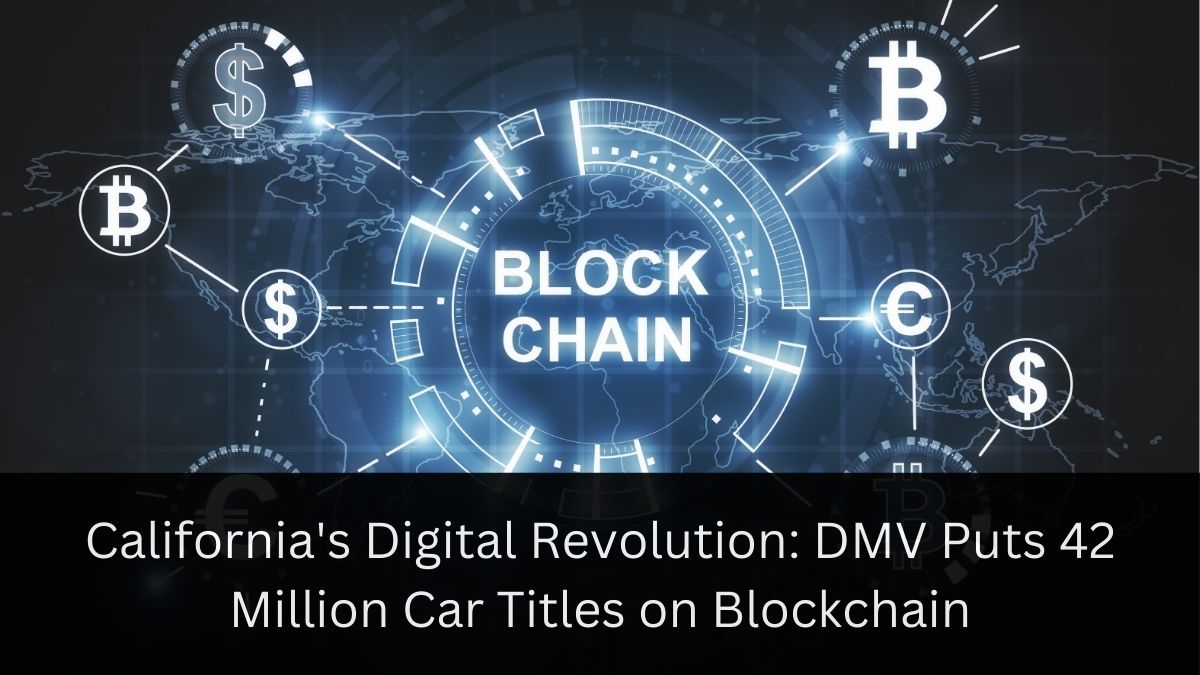Ad Tech
California’s Digital Revolution: DMV Puts 42 Million Car Titles on Blockchain

In a groundbreaking move that promises to reshape the landscape of vehicle ownership and management, the California Department of Motor Vehicles (DMV) has embarked on an ambitious project to digitize 42 million car titles using blockchain technology. This initiative, the first of its kind in the United States, aims to streamline processes, enhance security, and combat fraud in the automotive sector.
The Dawn of a New Era in Vehicle Management
From Paper to Digital: A Monumental Shift
For decades, car titles have existed primarily as physical documents, prone to loss, damage, and forgery. The California DMV’s decision to digitize these crucial records marks a significant departure from traditional practices. By leveraging the power of blockchain technology, the agency is not just modernizing its operations; it’s revolutionizing how we think about vehicle ownership documentation.
I remember the anxiety I felt when I misplaced my car title during a move a few years ago. The thought of navigating the bureaucratic maze to get a replacement was daunting. With this new system, such worries could become a thing of the past for California residents.
The Technological Backbone: Avalanche Blockchain
At the heart of this transformation lies the Avalanche blockchain, developed by Ava Labs. The choice of Avalanche for this project is noteworthy, given its reputation for speed, scalability, and energy efficiency compared to some older blockchain networks.
John Wu, president of Ava Labs, explained the process: “The first step was creating the 42 million titles associated as a token on the Avalanche blockchain, that’s what the State of California DMV has already done.” This foundational work sets the stage for the next phase of the project, which will bring these digital titles directly to California’s residents.
Benefits and Implications
Fraud Prevention: A New Line of Defense
One of the primary motivations behind this digital transition is the potential to significantly reduce fraud, particularly lien fraud. Blockchain technology creates an immutable, transparent record of ownership, making it exceptionally difficult for fraudsters to manipulate or falsify information.
For anyone who has ever been a victim of automotive fraud or knows someone who has, the implications of this enhanced security are profound. It’s not just about protecting a piece of paper; it’s about safeguarding one of the most significant investments many people make.
Convenience at Your Fingertips
The DMV plans to launch a mobile app that will allow California’s 39 million residents to access their digital car titles. This move promises to reduce the need for in-person DMV visits, a prospect that I’m sure will be welcomed by anyone who has ever spent hours waiting in line at a DMV office.
Imagine being able to transfer a vehicle title or check lien information with just a few taps on your smartphone. This level of convenience could transform what has traditionally been a cumbersome process into a quick, efficient transaction.
Environmental Impact
While not explicitly stated in the announcement, the environmental implications of this shift are worth considering. The reduction in paper usage and the decreased need for physical storage space could contribute to a smaller carbon footprint for the DMV and, by extension, the state of California.
Looking Ahead: Challenges and Opportunities
Rolling Out to the Public
The DMV is currently building out the app and infrastructure necessary for consumer access, with plans to make digital car titles available to California residents starting early next year. This rollout will likely be a critical phase, requiring careful management to ensure smooth adoption and address any initial hiccups.
Potential for Wider Adoption
California’s initiative could serve as a model for other states and even countries considering similar digitization efforts. The success or failure of this project could have far-reaching implications for how vehicle ownership is managed on a global scale.
Privacy and Security Considerations
As with any large-scale digitization project, especially one involving sensitive personal and financial information, privacy and security will be paramount. The DMV and its technology partners will need to ensure robust safeguards are in place to protect against data breaches and unauthorized access.
The Bigger Picture: Government and Blockchain
California’s car title project is not occurring in isolation. It’s part of a broader trend of government agencies exploring blockchain technology to improve services and efficiency. For instance, Deloitte has partnered with Ava Labs to develop a disaster recovery platform aimed at streamlining FEMA reimbursement applications.
These initiatives suggest a growing recognition of blockchain’s potential to address long-standing challenges in government operations. As more successful use cases emerge, we may see an acceleration in the adoption of blockchain technology across various public sector domains.
The California DMV’s blockchain project represents more than just a technological upgrade; it’s a glimpse into the future of how we might interact with government services and manage important documents. By embracing innovation, the DMV is not only addressing current challenges but also positioning itself to meet the evolving needs of California’s residents in the digital age.
As we watch this project unfold, it’s worth considering how similar technologies might transform other aspects of our lives. From property deeds to educational certificates, the potential applications of blockchain in document management and verification are vast.
For now, California leads the way in bringing car titles into the digital age. The success of this initiative could pave the way for a broader reimagining of how we handle important documents and interact with government agencies. As we move forward, it will be fascinating to see how this technology shapes the future of vehicle ownership and beyond.
